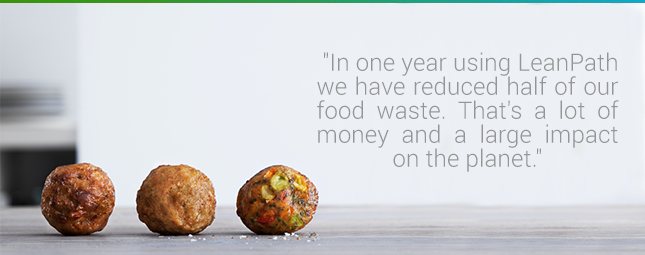
IKEA Lyssach, in northern Switzerland, serves 6,000 to 8,000 meals in a six-day work week. For the past year, it has been tracking food waste with LeanPath at its restaurant, co-worker restaurant, bistro and Swedish Food Market. The food waste data has driven targeted prevention strategies that brought a 50% reduction in food waste cost and a 45% reduction food waste weight in one year.
“That's a lot of money and a large impact on the planet,” says IKEA Lyssach food manager Adrian Gurtner.
It also translates to 3,481 meals saved.
IKEA Lyssach’s work is part of the company’s Food is Precious campaign, launched in 2017, with the goal of cutting food waste 50 percent by 2020 in its restaurants, bistros and Swedish Food Markets. Annually, over 660 million guests enjoy IKEA food in more than 400 stores in 49 markets. The company will reduce its environmental impact by reducing food waste, but also inspire change in others. LeanPath is proud to partner with IKEA since 2015, helping the company achieve this ambitious and important goal. As of February 2018, LeanPath, one of IKEA's two food waste partners, had helped the company prevent the equivalent of 2 million meals from being wasted.
IKEA Lyssach's path to reducing food waste
Engage coworkers on cost
According to Food Manager Adrian Gurtner, the biggest surprise for coworkers when they began using LeanPath was seeing how much their food waste was costing the store. Lyssach turns all its food waste into biogas, and this, Adrian says, gave coworkers the impression food waste was not a problem. “We had a solution for food waste after we created it, but they didn’t realize there was still a large financial impact.” They started focusing on reducing waste of high-cost items, like fried fish, which they began cooking to order, reducing waste by 20 percent.

Adjust production
For cold dishes, like pre-prepped salads, cold-smoked salmon tartar and chicken wraps, Lyssach had been prepping one batch each morning for the entire day. LeanPath data revealed the amount of waste this generated. The kitchen began a second prep after lunch, which allowed them to better forecast for the day. And since regulations require any prepped dishes to be used within 24 hours, it allowed them to continue selling prepped items into the next morning.
Repurpose
Adrian says that prior to LeanPath, he and his coworkers simply saw food waste as a part of doing business. Now they look for solutions. One is repurposing overproduced food for coworker meals. “We upcycle the food waste,” says Adrian. “We have vegetables we would have thrown away [before LeanPath]. Now we prevent food waste by making a vegetable soup for coworkers.”
